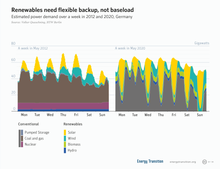Dunkelflaute

Dunkelflaute (German: [ˈdʊŋkəlˌflaʊtə], lit. 'dark doldrums' or 'dark wind lull'[1]) is a term used in the renewable energy sector to describe a period of time in which little to no energy can be generated with the use of wind and solar power.[2][3][4] These periods are a big issue in energy infrastructure, in which a significant amount of electricity is generated by renewables.[5][6] To ensure power during such periods alternative energy sources must be present in a sufficient capacity, energy can be imported or demand can be adjusted.[7] For alternative energy sources, countries use either fossil fuels (coal, oil and natural gas), hydroelectricity or nuclear power and, less often, energy storage to prevent power outages.[8][9][10][11][12] A group of countries is following on from Mission Innovation to work together to solve the problem in a clean low-carbon way by 2030: including looking into carbon capture and storage and the hydrogen economy as possible parts of the solution.[13]
See also[]
References[]
- ^ "When the wind goes, gas fills in the gap | Q1 2021 Quarterly Report | Electric Insights". 2021-05-24. Retrieved 2021-06-29.
- ^ "Dark doldrums: When wind and sun take a break". Retrieved 2021-05-27.
- ^ "Investigating the economics of the power sector under high penetration of variable renewable energies". Applied Energy. 267: 113956. 2020-06-01. doi:10.1016/j.apenergy.2019.113956. ISSN 0306-2619.
- ^ "Climatology of dark doldrums in Japan". Renewable and Sustainable Energy Reviews. 155: 111927. 2021-12-08. doi:10.1016/j.rser.2021.111927.
- ^ "What happens with German renewables in the dead of winter?". Retrieved 2021-05-28.
- ^ "When the wind goes, gas fills in the gap". Retrieved 2021-06-06.
- ^ Modelling 2050: Electricity System Analysis (PDF) (Report). Department for Business, Energy and Industrial Strategy.
- ^ Kosowski, Kai; Diercks, Frank (2021). "Quo Vadis, Grid Stability?" (PDF). atw. 66 (2): 16–26. ISSN 1431-5254.
- ^ Ernst, Damien. "Big infrastructures for fighting climate change" (PDF). Université de Liège.
- ^ Diermann, Ralph. "Energie: Wie riskant sind Dunkelflauten von Wind- und Solarenergie?". Süddeutsche.de (in German). Retrieved 2021-04-22.
- ^ Li, Bowen; Basu, Sukanta; Watson, Simon J.; Russchenberg, Herman W. J. (2020). "Mesoscale modeling of a "Dunkelflaute" event". Wind Energy. 24 (1): 5–23. doi:10.1002/we.2554. ISSN 1095-4244.
- ^ Abbott, Malcolm; Cohen, Bruce (2020). "Issues associated with the possible contribution of battery energy storage in ensuring a stable electricity system". The Electricity Journal. 33 (6): 106771. doi:10.1016/j.tej.2020.106771. ISSN 1040-6190.
- ^ "Major project aims to clear clean energy hurdle". BBC News. 2021-06-02. Retrieved 2021-06-03.
- Electric power generation